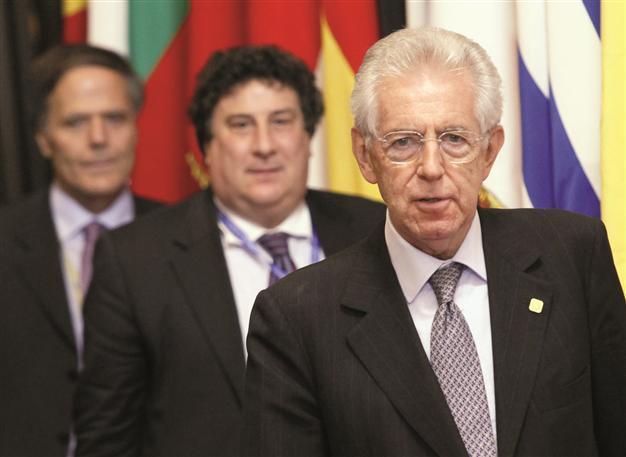Eurozone agrees on bond support in order to rescue Italy, Spain from debt
BRUSSELS - Reuters

Italy’s Prime Minister Mario Monti leaves a two-day European Union leaders summit in Brussels early June 29. The process was tough, but the outcome was good, says Monti regarding the EU summit in Brussels. REUTERS photo
Eurozone leaders agreed on June 29 to take emergency action to bring down Italy’s and Spain’s spiralling borrowing costs and to create a single supervisory body for eurozone banks by the end of this year, a first step towards a European banking union.Responding to pleas from Spanish and Italian leaders, a midnight summit of the 17-nation currency area agreed that euro area rescue funds could be used to stabilise bond markets without forcing countries that comply with EU budget rules to adopt extra austerity measures or economic reforms.
After hours of argument, they also agreed that the bloc’s future permanent bailout fund, the European Stability Mechanism, would be able to lend directly to recapitalize banks without increasing a country’s budget deficit, and without preferential seniority status. “The process was tough, the outcome was good,” Italian Prime Minister Mario Monti told reporters, adding that Italy did not intend “at this time” to apply for the emergency support.
‘Need to sign MoU’
Countries that requested bond support from the rescue fund would have to sign a memorandum of understanding setting out their existing policy commitments and agreeing a timetable. But they would not face the intrusive oversight of a “troika” of international lenders to which Greece, Ireland and Portugal have been subjected, Monti said.
Monti and his Spanish counterpart, Mariano Rajoy, had refused to sign off on a 120 billion euro ($149 billion) growth package until EU paymaster Germany approved short-term measures to ease their cost of credit. The clash highlighted tensions between northern creditor countries and heavily indebted southern states over the future shape of the troubled 17-nation currency bloc, now in the third year of a sovereign debt crisis.
European Council chairman Herman Van Rompuy said the aim was to create a supervisory mechanism for eurozone banks involving the European Central Bank to break the “vicious circle” of dependence between banks and sovereign governments.
“The aim is of course to make the euro an irreversible project,” he added. The euro surged by 1.1 percent to $1.2581 after the eurozone affirmed its commitment to use its bailout funds more flexibly and efficiently to stabilise markets. But whether investors regard the deal struck at the 20th summit since the crisis erupted in early 2010 as sufficient remains to be seen. Previous relief rallies have fizzled within days or hours as new doubts set in.
German Chancellor Angela Merkel, leader of Europe’s biggest economy, said she was satisfied with the result although she had dismissed any need for emergency support for Italian and Spanish bonds earlier this week.
The cost of borrowing for 10 years for Spain and Italy fell sharply on the eurozone bond market early on June 29 after eurozone leaders agreed breakthrough measures to fight the debt crisis. The interest rate or yield on 10-year Spanish debt fell to 6.466 percent from 6.896 percent late on June 28. The Italian 10-year yield fell to 5.865 percent from 6.182 percent.
World stock markets also surged, propelled by bank shares, and the euro jumped against the dollar after the summit. The Madrid and Rome markets were the biggest gainers after emergency aid to crisis-hit Spain and Italy was announced.In late morning deals June 29, London’s benchmark FTSE 100 index rallied 1.22 percent, Frankfurt’s DAX 30 jumped 1.89 percent and the Paris CAC 40 spiked 2.05. Madrid rocketed 2.46 percent and Milan 2.36 percent.
















